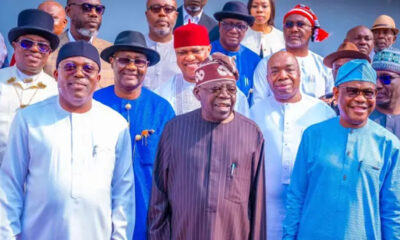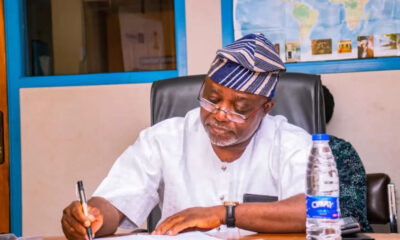Opinion
4th Republic, From Obasanjo to Buhari with gloom

By Tunde Odesola
(Published in The PUNCH on Monday, December 21, 2020)
Because there’s absolutely nothing inspiring about the most popular Buhari that I know, I can’t name my son Buhari. Buhari bawo? Naming my son Buhari would be an unforgivable sin against the infant.
But, can you, my reader, name your own son Buhari? Why, if yes, and why not, if no?
Naming my son Buhari would tantamount to yanking off the shawl of innocence enshrouding my newborn, dipping it in the mud and raising the bemired shawl up like Boko Haram would raise the severed head of an innocent victim up on a dripping pole.
I won’t name my son Buhari because I don’t want to incur upon him the curses invoked by Nigerians on the blundering Nigerian leader, Major General Muhammadu Buhari (retd.), after innocent protesters were mowed down on October 20, 2020 at the Lekki Tollgate Plaza, Lagos, by zombie soldiers who pierced the night with bullets.
In their dying moments, the over 100 Borno rice farmers blindfolded and shackled at the limbs like condemned dogs before Ogun shrine must have taken terrible thoughts of Buhari’s incompetence along with them to their graves as sharp Boko Haram knives slashed open their throats and their hot blood squirted in vain for justice.
When a certain Joe Chinakwe christened his dog Buhari in 2016, he was arrested and charged with ‘breach of peace’. I love and breed dogs, but I don’t want Chinakwe’s fate to befall me. I have a pitbull stud named Bond.
I love my pitbull so much I can’t rename him or any puppy he sired Buhari because Bond isn’t only active, Bond knows the importance of security and takes it seriously. Bond will defend you to the death.
Generally, couples name their newborns from the abundance of their hearts, wishing their babies would grow up and follow in the footsteps of the personalities they named them after.
Also, in the not-too-distant past, the names parents give their infants reflect their fears when they suspect that their newborns are abiku.
Globally, millions of parents have named their children after celebrity sportspeople, inventors, politicians, actors, musicians, clerics, moneybags etc.
To name a child after a particular personality, the personality, basically, is expected to possess values intrinsic to the promotion of humanistic ideals.
When she visited Nigeria at the peak of her reign, many Nigerian parents named their baby girls, Elizabeth, after Queen Elizabeth of England just as many parents named their baby boys Obafemi, Nnamdi and Ahmadu in reverence for foremost Nigerian leaders, Chief Obafemi Awolowo, Chief Nnamdi Azikiwe and Alhaji Ahmadu Bello.
Since assuming power in 2015, President Buhari has been unpretentious about the higher-than-human status his administration was granting cows and their caregivers called herdsmen. Between 2015 and 2020, cows moved from the position of ordinary citizens to first class citizens and now to super citizens.
Nowadays, Nigerian cows are luckier than privileged Nigerian citizens. They’re also luckier than cows in India, where killing a cow for food fetches life imprisonment in the Hindu-dominated western state of Gujarat. Hinduism recognises cow worship, Islam doesn’t; and Buhari is a muslim.
On Nigerian highways, cows lead, motorists follow. A motorist who accidentally hits a cow on the highway, will be sent to the grave by herdsmen as an advance party, should the cow not survive the impact from the hit-and-die driver.
Therefore, if security forces could teargas parents in Katsina, protesting the abduction of their 344 sons from Government Science Secondary School, Kankara, Katsina State, make no mistake about this: Buhari’s seeming show of love to herdsmen is fake.
Like ex-President Olusegun Obasanjo, Buhari sees himself as being greater than Nigeria and believes the country owes him gratitude for misgoverning over it.
If Buhari truly loves the northern talakawa, young minds who are recruited and radicalised by Boko Haram, would have been long taken off the streets – into schools or vocations.
It’s crystal clear that Buhari’s show of love to Hausa-Fulani herdsmen and the talakawa, in general, is merely to court their influence in the northern political matrix. It’s also a lethargic potion to maroon and lock northern youth activism in the cell of ignorant docility and exploitation.
The number of wastrel northern youths ready to pull the dagger in blind defence of Buhari unbares the fangs of tribalism that defines the Buhari mystique.
To sustain Buhari’s fast-fading mystique, one of his media aides, Shehu Garba, last week told a heinous lie capable of making Satan repent and seek salvation.
In the prism of Garba’s jaundiced journalism, 344 kidnapped schoolboys of Government Science Secondary School, Kankara, Katsina State, became 10 just to maintain the Buhari mystique and drape the garment of honour on a tattered administration.
While Nigeria and the international community bemoaned the fate of the innocent children, Garba, whose children were nestling in safety and opulence, still maintained for many days that the number of the kidnapped children was 10.
But when the boys were returned after an exchange between Nigerian security forces and the bandits, Garba ‘discovered’ that the true number of the schoolboys kidnapped was 344. The truth didn’t set Garba free, however.
Instead, the truth tied Garba’s arms and feet backwards and dumped him on the dunghill of public ridicule after he said, “I apologise for the incorrect communication citing that only 10 students were kidnapped at the science school, Kankara.
“This communication of numbers was provided by persons that should ideally know. These numbers were seen to conflict with what was available at that time.
“Please understand that this communication was in no way done to downplay the seriousness of the situation. Please accept my sincere apologies on this matter as we continue to move our great Nation Nigeria forward.”
For seven days, Garba didn’t retract the false number he fed the whole world with even after the Governor of Katsina, Aminu Masari, said more than 300 students were kidnapped from the school.
Garba knew that the crown of security had tumbled down the head of Buhari, hence he needed to cover the President’s pate with the zucchetto of ‘only-10-boys-were-kidnapped’.
Garuba, as the Yoruba would call him, drowned the cries of the agonising parents in an ocean of lies just to preserve the broth and the brood.
Shockingly, he wasn’t ashamed to dart to the podium and share in the victory of the boys’ recovery. This typical shenanigan defines the Buhari presidency.
If I was chairman of a university senate, I’ll name the Minister of Information and Culture, Alhaji Lai Mohammed, a professor. Professor Lai Mohammed was lying in wait for Garba to finish his leg of the unending marathon of lies when he said though Buhari never visited Kankara, ‘the President coordinated the rescue effort from Daura.’.
If the President coordinated the rescue effort as claimed by Professor Lai, that means the President, going by the misinformation claimed by Garba, must have been seeking the release of just 10 schoolboys.
Then, at what stage did the bandits on the other end of the phone say, “Mr President, you’re running a shambolic government. At this stage, you should know that we carted away 344 schoolboys, and not 10?”
Same last week, ex-President Obasanjo put the lid on the monumental waste the Fourth Republic had been when he said the late Chief Lamidi Adedibu won Oyo State for the Peoples Democratic Party without mentioning the bloodshed and violence that characterised PDP’s rule when he was President from 1999 to 2007.
The late Adedibu publicly said he spearheaded the illegal removal of then Governor Rashidi Ladoja because Ladoja didn’t lay the treasure of the Oyo State Government bare at Molete.
From Oyo to Ekiti to Anambra and many other states of the federation, the impunity of Obasanjo’s government ranks higher than that of Buhari, whose government holds the title of the Most Lifeless Government in Nigerian history.
Email: tundeodes2003@yahoo.com
Facebook: @tunde odesola
Twitter: @tunde_odesola
Opinion
AFCON 2025: Flipping Content Creation From Coverage to Strategy

AFCON 2025: Flipping Content Creation From Coverage to Strategy
By Toluwalope Shodunke
The beautiful and enchanting butterfly called the Africa Cup of Nations (AFCON) emerged from its chrysalis in Khartoum, Sudan, under the presidency of Abdelaziz Abdallah Salem, an Egyptian, with three countries—Egypt, Sudan, and Ethiopia—participating, and Egypt emerging as the eventual winner.
The reason for this limited participation is not far-fetched. At the time, only nine African countries were independent. The remaining 45 countries that now make up CAF’s 54 member nations were either pushing Queen Elizabeth’s dogsled made unique with the Union Jack, making supplications at the Eiffel Tower, or knocking at the doors of the Palácio de Belém, the Quirinal Palace, and the Royal Palace of Brussels—seeking the mercies of their colonial masters who, without regard for cultures, sub-cultures, or primordial affinities, divided Africa among the colonial gods.
From then until now, CAF has had seven presidents, including Patrice Motsepe, who was elected as the seventh president in 2021. With more countries gaining independence and under various CAF leaderships, AFCON has undergone several reforms—transforming from a “backyard event” involving only three nations into competitions featuring 8, 16, and now 24 teams. It has evolved into a global spectacle consumed by millions worldwide.
Looking back, I can trace my personal connection to AFCON to table soccer, which I played alone on concrete in our balcony at Olafimihan Street—between Mushin and Ilasamaja—adjacent to Alafia Oluwa Primary School, close to Alfa Nda and Akanro Street, all in Lagos State.
Zygmunt Bauman, the Polish-British sociologist who developed the concept of “liquid modernity,” argues that the world is in constant flux rather than static, among other themes in his revelatory works.
For the benefit of Millennials (Generation Y) and Generation Z—who are accustomed to high-tech pads, iPhones, AI technologies, and chat boxes—table soccer is a replica of football played with bottle corks (often from carbonated drinks or beer) as players, cassette hubs as the ball, and “Bic” biro covers for engagement. The game can be played by two people, each controlling eleven players.
I, however, enjoyed playing alone in a secluded area, running my own commentary like the great Ernest Okonkwo, Yinka Craig, and Fabio Lanipekun, who are all late. At the time, I knew next to nothing about the Africa Cup of Nations. Yet, I named my cork players after Nigerian legends such as Segun Odegbami, Godwin Odiye, Aloysius Atuegbu, Tunji Banjo, Muda Lawal, Felix Owolabi, and Adokiye Amiesimaka, among others, as I must have taken to heart their names from commentary and utterances of my uncles resulting from sporadic and wild celebrations of Nigeria winning the Cup of Nations on home soil for the first time.
While my connection to AFCON remained somewhat ephemeral until Libya 1982, my AFCON anecdotes became deeply rooted in Abidjan 1984, where Cameroon defeated Nigeria 3–1. The name Théophile Abéga was etched into my youthful memory.
Even as I write this, I remember the silence that enveloped our compound after the final whistle.
It felt similar to how Ukrainians experienced the Battle of Mariupol against Russia—where resolute resistance eventually succumbed to overwhelming force.
The Indomitable Lions were better and superior in every aspect. The lion not only caged the Eagles, they cooked pepper soup with the Green Eagles.
In Maroc ’88, I again tasted defeat with the Green Eagles (now Super Eagles), coached by the German Manfred Höner. Players like Henry Nwosu, Stephen Keshi, Sunday Eboigbe, Bright Omolara, Rashidi Yekini, Austin Eguavoen, Peter Rufai, Folorunsho Okenla, Ademola Adeshina, Yisa Sofoluwe, and others featured prominently. A beautiful goal by Henry Nwosu—then a diminutive ACB Lagos player—was controversially disallowed.
This sparked outrage among Nigerians, many of whom believed the referee acted under the influence of Issa Hayatou, the Cameroonian who served as CAF president from 1988 to 2017.
This stroll down memory lane illustrates that controversy and allegations of biased officiating have long been part of AFCON’s history.
The 2025 Africa Cup of Nations in Morocco, held from December 21, 2025, to January 18, 2026, will be discussed for a long time by football historians, raconteurs, and aficionados—for both positive and negative reasons.
These include Morocco’s world-class facilities, the ravenous hunger of ball boys and players (superstars included) for the towels of opposing goalkeepers—popularly dubbed TowelGate—allegations of biased officiating, strained relations among Arab African nations (Egypt, Algeria, Tunisia, and Morocco), CAF President Patrice Motsepe’s curt “keep quiet” response to veteran journalist Osasu Obayiuwana regarding the proposed four-year AFCON cycle post-2028, and the “Oga Patapata” incident, where Senegalese players walked off the pitch after a legitimate goal was chalked off and a penalty awarded against them by DR Congo referee Jean-Jacques Ndala.
While these narratives dominated global discourse, another critical issue—less prominent but equally important—emerged within Nigeria’s media and content-creation landscape.
Following Nigeria’s qualification from the group stage, the Super Eagles were scheduled to face Mozambique in the Round of 16. Between January 1 and January 3, Coach Eric Chelle instituted closed-door training sessions, denying journalists and content creators access, with media interaction limited to pre-match press conferences.
According to Chelle, the knockout stage demanded “maximum concentration,” and privacy was necessary to protect players from distractions.
This decision sparked mixed reactions on social media.
Twitter user @QualityQuadry wrote:
“What Eric Chelle is doing to journalists is bad.
Journalists were subjected to a media parley under cold weather in an open field for the first time in Super Eagles history.
Journalists were beaten by rain because Chelle doesn’t want journalists around the camp.
Locking down training sessions for three days is unprofessional.
I wish him well against Mozambique.”
Another user, @PoojaMedia, stated:
“Again, Eric Chelle has closed the Super Eagles’ training today.
That means journalists in Morocco won’t have access to the team for three straight days ahead of the Round of 16.
This is serious and sad for journalists who spent millions to get content around the team.
We move.”
Conversely, @sportsdokitor wrote:
“I’m not Eric Chelle’s biggest supporter, but on this issue, I support him 110%.
There’s a time to speak and a time to train.
Let the boys focus on why they’re in Morocco—they’re not here for your content creation.”
From these three tweets, one can see accessibility being clothed in beautiful garments. Two of the tweets suggest that there is only one way to get to the zenith of Mount Kilimanjaro, when indeed there are many routes—if we think within the box, not outside the box as we’ve not exhausted the content inside the box.
In the past, when the economy was buoyant, media organisations sponsored reporters to cover the World Cup, Olympics, Commonwealth Games, and other international competitions.
Today, with financial pressures mounting, many journalists and content creators seek collaborations and sponsorships from corporations and tech startups to cover sporting events, who in turn get awareness, brand visibility, and other intangibles.
As Gary Vaynerchuk famously said, “Every company is a media company.” Yet most creators covering AFCON 2025 followed the same playbook.
At AFCON 2025, most Nigerian journalists and content creators pitched similar offerings: on-the-ground coverage, press conferences, team updates, behind-the-scenes footage, analysis, cuisine, fan interactions, and Moroccan cultural experiences.
If they were not interviewing Victor Osimhen, they were showcasing the stand-up comedy talents of Samuel Chukwueze and other forms of entertainment.
What was missing was differentiation. No clear Unique Selling Proposition (USP). The result was generic, repetitive content with little strategic distinction. Everyone appeared to be deploying the same “Jab, Jab, Jab, Hook” formula—throwing multiple jabs of access-driven content in the hope that one hook would land.
The lesson is simple: when everyone is jabbing the same way, the hook becomes predictable and loses its power.
As J. P. Clark wrote in the poem “The Casualties”, “We are all casualties,” casualties of sameness—content without differentiation. The audience consumes shallow content, sponsors lose return on investment, and creators return home bearing the “weight of paper” from disappointed benefactors.
On November 23, 1963, a shining light was dimmed in America when President John F. Kennedy was assassinated.
As with AFCON today, media organisations sent their best hands to cover the funeral, as the who’s who of the planet—and if possible, the stratosphere—would attend. Unconfirmed reports suggested that over 220 VVIPs were expected.
While every newspaper, radio, and television station covered the spectacle and grandeur of the event, one man, Jimmy Breslin, swam against the tide. He chose instead to interview Clifton Pollard, the foreman of gravediggers at Arlington National Cemetery—the man who dug John F. Kennedy’s grave.
This act of upended thinking differentiated Jimmy Breslin from the odds and sods, and he went on to win the Pulitzer Prize in 1986.
Until journalists and content creators stop following the motley and begin swimming against the tide, access will continue to be treated as king—when in reality, differentiation, aided by strategy, is king.
When every journalist and content creator is using Gary Vaynerchuk’s “Jab, Jab, Jab, Hook” template while covering major sporting events, thinkers among them must learn to replace one jab with a counterpunch—and a bit of head movement—to stay ahead of the herd.
Toluwalope Shodunke can be reached via tolushodunke@yahoo.com
Opinion
“Christian Genocidization” of the Kaiama massacre, By Farooq Kperogi

“Christian Genocidization” of the Kaiama massacre, By Farooq Kperogi
“Christian Genocidization” of the Kaiama massacre, By Farooq Kperogi
Kperogi is a renowned Nigerian columnist and United States-based professor of Journalism
Opinion
Descending from Fela’s Afrobeat to Wizkid’s Afrobeats

Descending from Fela’s Afrobeat to Wizkid’s Afrobeats
Tunde Odesola
(Published in The PUNCH, on Friday, January 30, 2026)
Three occupants of a black Mercedes-Benz were heading to work on a good Friday morning. One was the driver, another was the aide, and their oga patapata. They came to crawling traffic on George Street in Ikoyi, Lagos, en route to Obalende, their office. The Federal Secretariat was at a touching distance.
Suddenly, a hail of gunshots rained on the black Benz like a hundred stones from the devil’s sling. Then the tyres screeched away. Then silence. Rivulets of hot blood trickled from the heads and torsos of the driver, the aide and General Murtala Ramat Mohammed. This was February 13, 1976, the first bad Friday I knew.
The second bad Friday was on February 18 of the following year. I had bounced off to St Paul’s Anglican Primary School, Idi-Oro, Lagos, in the morning, having celebrated a quiet birthday a day before. Except for the khaki-wearing planners of sorrows, tears and blood, no one else had a foreboding of what lay ahead in the day.
My class was in full session on the middle floor of the school’s two-storey wing when the news broke and shattered peace and learning. “Soldiers are attacking Fela’s house! Lagos is on fire!”
Yeepa! Fela’s house was a stone’s throw from my school. Before the teacher finished passing the information to the class, she had grabbed her bag, just as the school bell sounded, summoning everyone to the assembly ground. Exhibiting no emotion, a fair-complexioned, slim and fatherly teacher, Mr Mayungbe, disclosed the reason why the school was closing abruptly, strictly warning pupils to head straight home.
He said pupils whose homes were around Fela’s house in the Moshalashi area should wait behind for their parents and guardians to come and pick them up. Subsequently, our class teachers brought out the registers containing pupils’ addresses, calling those whose houses were not around Fela’s house to head home. My name was called. I jumped out, my bag slung across my back and headed towards the gate.
READ ALSO:
- Garba Shehu Explains Why Buhari Approved Hadiza Bala Usman’s Removal from NPA
- Police Commission Appoints New DIG, Promotes 2 AIGs, 26,119 Inspectors Nationwide
- Petrol Prices Poised to Rise Again as Global Crude Oil Market Surges
At the school gate, I thought it was a betrayal to go home and not witness the injustice soldiers were inflicting on the beautiful white house of my hero; the house located by a bend, the house whose architecture I beheld and ogled at during incessant truancy trips. So, I headed to Fela’s house located on No 14 Agege Motor Road, Idi-Oro, where thousands of soldiers were deployed to destroy a harmless civilian, his family and livelihood. Yes, livelihood, because the house had a recording facility. It also had a free health clinic. This was during the military regime headed by General Olusegun Obasanjo, an Egba man like Fela. The barbaric soldiers threw Fela’s 78-year-old mother through the window of the storey building. And she died.
To weigh in on the supremacy fire raging between Fela’s son, Seun, and Afrobeats star, Ayodeji Balogun, popularly known as Wizkid, the aforementioned background from the eyes of a little boy sheds light on the indomitable spirit of the Abami Eda, and why his legacy as the founder and father of Afrobeat is forever encased in gold.
Without ever meeting Wizkid, I wrote a two-part article titled “The god that cut soap for Wizkid” in THE PUNCH more than two years ago. The articles, published in the month of September 2023, extol the humility of Wizkid’s mother, Mrs Morayo Balogun, and the grace upon the life of her superstar son, Ayodeji.
On Friday, May 19, 2023, in a public show of shame, Seun slapped a police officer on the Third Mainland Bridge. I penned “Seun Kuti’s double-edged slap” to criticise Seun’s arrogance and stupidity. Seun’s action on that day exposes the impunity men and women of power and influence inflict when relating with people they consider lower on the social rungs. Fela, despite his avowed stance on human rights advocacy, reportedly fell short on that account on a number of occasions. Neither is Wizkid a saint in this regard. Nigeria’s big men, more often than not, exploit the weakness in law enforcement to get away with any crime. A power monger called Wasiu Ayinde disrupted a flight and attempted to stop a plane from taking off; instead of a time in jail, he was given an award. Because he was close to President Bola Tinubu.
Let’s be clear from the outset, please. This article is not a magisterial judgment on who is right or wrong in the Seun-Wizkid fight. Mark my words – Seun-Wizkid fight, not Fela-Wizkid fight. To place Fela on the same pedestal as Wizkid is to compare the storm in a teacup with the roar of the Atlantic. Igi imu jinna si ori, the distance between the nose and forehead is far. It is arduous for the fingerless fellow to thread the thread through the eye of the needle. Fela is the creator, Wizkid is the creation.
A product of the University of Ibadan and the Imperial College, London, where he specialised in Sound Processing, octogenarian music producer, the legendary Odion Iruoje, is renowned as the producer of Nigeria’s first true pop music with his collaboration with the teenage sensation band, Ofege. Iruoje, who produced a series of Fela’s first hits, including ‘Jeun Kooku’, ‘Beautiful Dancer’, ‘Alijonjokijo’, and ‘Ojuelegba’, gave an insight into how Fela created Afrobeat.
READ ALSO:
- Emefiele Allegedly Withdrew $6.23 Million Using Forged Documents — Witness Testifies
- APC Opens Dialogue With Wike to End Fubara Crisis in Rivers
- Lassa Fever Kills 17 Nigerians Across Eight States in Three Weeks — NCDC
In an interview on popular online media, Agbaletu TV, Iruoje, who read Industrial Electronics and Control Systems, said Fela came to one of the foremost recording companies in the country, E.M.I, upon returning from England, where he recorded an unsuccessful album, ‘Won Fe Gba Aya Wa’, with E.M.I. in London. The sound guru described Fela as a troublemaker whom E.M.I London didn’t want to deal with.
“When he came to me, he said, ‘Mr Iruoje, I have a new sound now, and it is called Afrobeat’. I told him what sound do you have that I have never heard before? I didn’t understand what he was saying. I told him there’s no sound you are going to play outside Highlife. So, I went to audition (him). Goodness! I couldn’t believe it when he started the horns. I have never heard such a horn arrangement in my life. No one ever did that – plenty of horns – the arrangement, ha! I couldn’t believe what I was hearing. I have never heard such a sound before. I said we have to go to the studio.
“In fact, the MD (a white man) came to my audition, he was listening to it, he said, ‘Mr Iruoje, please, can you get this man into the studio before he changes his mind?’ I said no, I have not finished with the rehearsal, he (the MD) said no, no, please, Mr Iruoje, you know he is very unstable, he could change his mind. I told the MD that Fela would not change his mind on me.
“The MD and I did not believe him when he first came to announce that he had a new sound. But he said, ‘Odion, come to the Shrine and listen to it, and see what few changes you want to do to it, and I went, we did a few changes. His rhythm guitar was (new), and first-time of his time, then he added tenor guitar and lead guitar. So, Fela had more guitars than the regular Highlife band. The regular Highlife band had only one guitar and bass, but Fela had all four. Fela influenced Juju bands because they started introducing tenor, rhythm and other guitars.”
On Fela’s flip side, Iruoje described the political activist, culture advocate and social crusader as a troublemaker, whom recording companies did not want to touch with a long pole. Because he gave E.M.I. London troubles over royalties, Iruoje was told by the authorities of the E.M.I branch in Nigeria not record Fela.
“If he signs a contract which states that his royalty would be so much (amount), that is what he signed before going to the studio, once he goes into the studio and the song starts selling and becomes a hit, he would say, “That song is no more N80 o, he wants to get N100 or N200. At times, he would snatch the master tape,” Iruoje said.
If told he signed a contract, Iruoje said, “Fela would say, what is contract? Contract is ordinary paper. That music is more than what is in the contract. He would snatch the master tape now, (and say) he was not going to release it. He (would say) we had to change that. Maybe, at times, I may not be in when he’s making the trouble, when I come back, they would say, “See what your man is doing o. He has taken (the master tape). Then I would send somebody to call him. He would come to my office because he respects me.”
To be continued.
Email: tundeodes2003@yahoo.com
Facebook: @Tunde Odesola
X: @Tunde_Odesola
Descending from Fela’s Afrobeat to Wizkid’s Afrobeats
-

 News2 days ago
News2 days agoBREAKING: Tinubu Holds Reconciliation Meeting With Wike, Fubara, Rivers Leaders at Aso Rock
-

 Business3 days ago
Business3 days agoBoI Gets CBN Approval to Launch Non‑Interest Banking Window in Nigeria
-

 metro2 days ago
metro2 days agoLeadership Crisis at NAHCON as Chairman Abdullahi Saleh Usman Resigns
-

 News2 days ago
News2 days agoUS Judge Orders FBI, DEA to Release Tinubu’s Criminal Records, Faults Delays
-

 News1 day ago
News1 day agoOyo Muslims Reaffirm Loyalty to Sultan on Islamic Matters — Grand Chief Imam
-

 News2 days ago
News2 days agoOWN Calls for Immediate Resignation of INEC Chairman
-

 International2 days ago
International2 days agoUS to Deport 18 More Nigerians on ‘Worst-of-the-Worst’ Criminal List (Full Names)
-

 Business2 days ago
Business2 days agoNaira Posts Strong Comeback, Breaking Two‑Year High Against Dollar














You must be logged in to post a comment Login